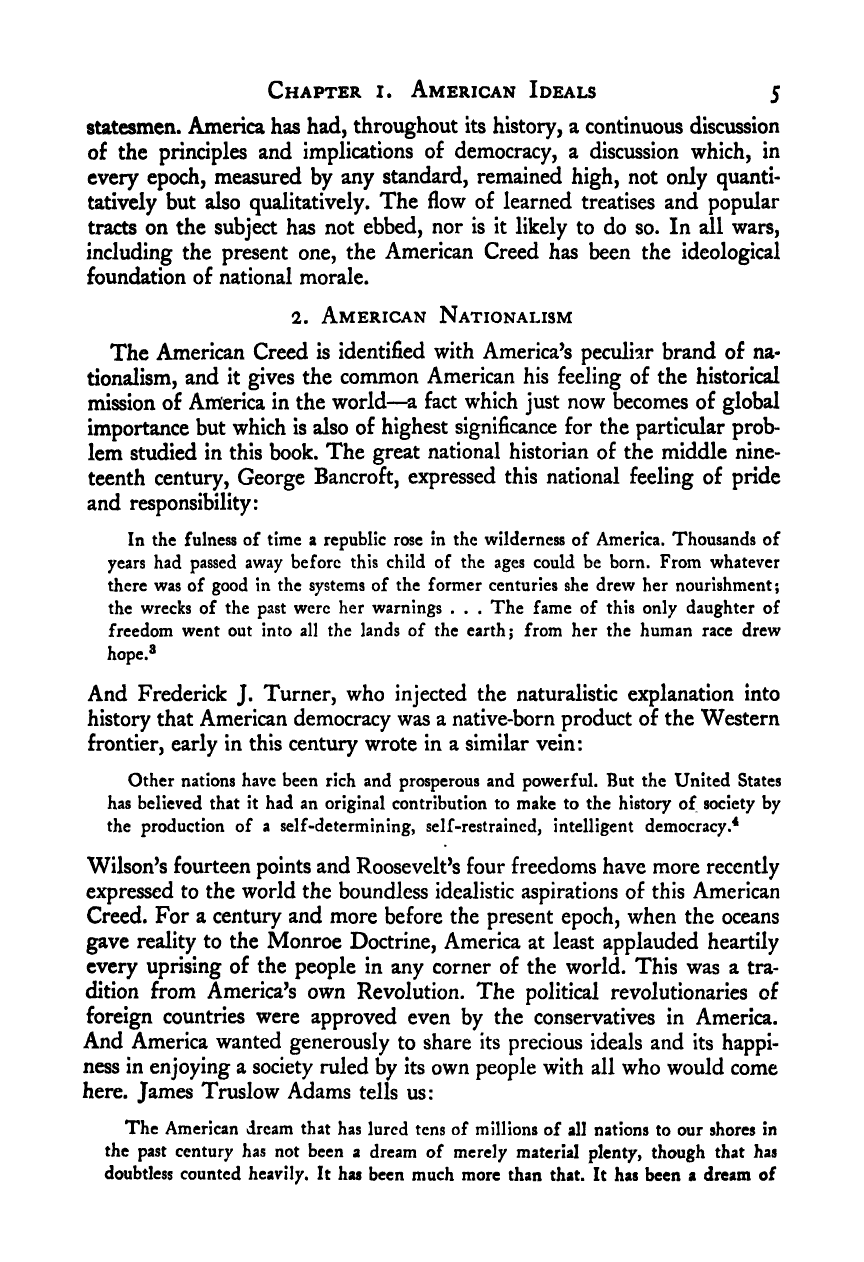Note: Gunnar Myrdal died in 1987, less than 70 years ago. Therefore, this work is protected by copyright, restricting your legal rights to reproduce it. However, you are welcome to view it on screen, as you do now. Read more about copyright.
Full resolution (TIFF) - On this page / på denna sida - I. The Approach - 1. American Ideals and the American Conscience - 1. Unity of Ideals and Diversity of Culture - 2. American Nationalism

<< prev. page << föreg. sida << >> nästa sida >> next page >>
Below is the raw OCR text
from the above scanned image.
Do you see an error? Proofread the page now!
Här nedan syns maskintolkade texten från faksimilbilden ovan.
Ser du något fel? Korrekturläs sidan nu!
This page has never been proofread. / Denna sida har aldrig korrekturlästs.
Chapter i. American Ideals 5
statesmen. America has had, throughout its history, a continuous discussion
of the principles and implications of democracy, a discussion which, in
every epoch, measured by any standard, remained high, not only quanti-
tatively but also qualitatively. The flow of learned treatises and popular
tracts on the subject has not ebbed, nor is it likely to do so. In all wars,
including the present one, the American Creed has been the ideological
foundation of national morale.
2. American Nationalism
The American Creed is identified with America’s peculiar brand of na-
tionalism, and it gives the common American his feeling of the historical
mission of America in the world—a fact which just now becomes of global
importance but which is also of highest significance for the particular prob-
lem studied in this book. The great national historian of the middle nine-
teenth century, George Bancroft, expressed this national feeling of pride
and responsibility:
In the fulness of time a republic rose in the wilderness of America. Thousands of
years had passed away before this child of the ages could be born. From whatever
there was of good in the systems of the former centuries she drew her nourishment;
the wrecks of the past were her warnings . . , The fame of this only daughter of
freedom went out into all the lands of the earth; from her the human race drew
hope.®
And Frederick J. Turner, who injected the naturalistic explanation into
history that American democracy was a native-born product of the Western
frontier, early in this century wrote in a similar vein:
Other nations have been rich and prosperous and powerful. But the United States
has believed that it had an original contribution to make to the history of society by
the production of a self-determining, self-restrained, intelligent democracy.*
Wilson^s fourteen points and Roosevelt^s four freedoms have more recently
expressed to the world the boundless idealistic aspirations of this American
Creed. For a century and more before the present epoch, when the oceans
gave reality to the Monroe Doctrine, America at least applauded heartily
every uprising of the people in any corner of the world. This was a tra-
dition from Americans own Revolution. The political revolutionaries of
foreign countries were approved even by the conservatives in America.
And America wanted generously to share its precious ideals and its happi-
ness in enjoying a society ruled by Its own people with all who would come
here. James Truslow Adams tells us:
The American dream that has lured tens of millions of all nations to our shores in
the past century has not been a dream of merely material plenty, though that has
doubtless counted heavily. It has been much more than that. It has been a dream of
<< prev. page << föreg. sida << >> nästa sida >> next page >>